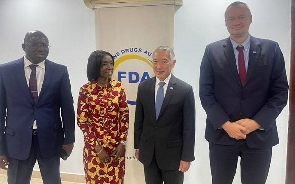Ghana has become the first country in Africa to manufacture a cholera vaccine, giving the country to boost as the future vaccine manufacturing on the continent.
It was produced by DEK Vaccines Limited, a private sector-led consortium of Ghanaian pharmaceutical companies comprising Danadams, Ernest Chemists, and Kinapharma.
According to Dr. Kofi Nsiah-Poku, Managing Director of DEK Vaccines Limited, the cholera vaccine was one of six other vaccines, including vaccines against Malaria, HPV, Pneumonia, and Rotavirus, which would be ready by 2026.
He was speaking to the Ghanaian Times in Accra on Friday on the sidelines of a working visit of the Director General of the International Vaccine Institute, Dr Jerome Kim, to Ghana.
The company, he said, was targeting to produce 600 million doses of the various vaccines annually when the newly installed manufacturing plant operates at its full capacity in about two years.
Dr. Nsiah-Poku stated that currently, the company was working on a typhoid vaccine, which included the completion of all necessary tests, and was awaiting the World Health Organisation (WHO) certification for production to commence.
He explained that the company’s drive to enhance vaccine manufacturing locally followed a licensing and technology transfer agreement with the IVI, a non-profit international organisation, for the manufacturing of the vaccines.
“The agreement is significant for us as it enables drug substance manufacturing capability to be built, that is production of the antigen or raw material needed to manufacture actual vaccines,” he added.
The production of vaccines locally, Dr. Nsiah-Poku explained, would enable Ghana and the West African sub-region to reduce the critical shortage of vaccines needed to prevent malaria, cholera, cervical cancer, and other fatal diseases.
Dr Kim said the transfer of vaccine manufacturing technology to Ghana was critical in ensuring that the country, and Africa in general, was able to produce its own vaccines and as well as adequately respond to future pandemics.
The IVI, he stated, was focused on improving access to life-saving technologies to meet the ambitious goal of enabling Africa manufacture 60 percent of vaccines it needs against some diseases.
“This is in support of the commitment by African leaders to create an indigenous vaccine industry, with the goal of boosting the share of vaccines manufactured in Africa from one percent in 2021 to 60 percent in 2040.
“It will go a long way in making Ghana and other African countries dependent on its own vaccines when faced with another pandemic,” Dr Kim added.
He commended Ghana for putting in place the necessary structures, including laboratory and field testing, for effective regulation of vaccine manufacturing to ensure quality.
As a country with advanced vaccine regulatory system, Dr Kim urged Ghana to help strengthen other regulatory bodies in Africa to enable sustainable manufacturing of vaccines.
He said the IVI was seeking to make Ghana the 41st member of IVI in view of the existing vaccine manufacturing system that had been designed and under implementation, resulting in partnerships.
Chief Executive Officer of the Food and Drugs Authority (FDA), Dr. Delese Mimi Darko, noted that the Authority was poised to support vaccine development in Ghana and on the continent, adding that Mozambique, Senegal, and others in the region were benefitting from clinical trials, market surveillance, and licensing systems.
Health News of Monday, 4 September 2023
Source: ghanaiantimes.com.gh

















